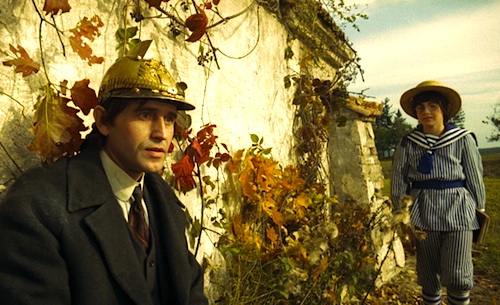By Joe Bendel. Smuggling a censored film was a trickier proposition in 1973. Instead of a flash drive, you had to schlep cans of film. Nevertheless, Wojciech Has managed to convey his banned, mind-bending prestige production to Cannes, where the jury led by Ingrid Bergman awarded it the Jury Prize. While never explicitly political, it is easy to see why Has’s The Hourglass Sanatorium would be too much for a risk averse Communist apparatchik to countenance when it screens as a handpicked selection of Martin Scorsese Presents: Masterpieces of Polish Cinema, hosted by the Film Society of Lincoln Center.
Based on the novel and short stories of Bruno Schulz, Hourglass is never intimidated by the constraints of narrative. Józef is traveling to a remote sanatorium, where his lower middle class merchant father Jakub is a patient. Actually, his father is already dead everywhere else except the decaying sanatorium. Within the crumbling walls, the randy inattentive staff apparently has the power to roll back time to a point where his father is still living. Through the strange power of the sanatorium, Józef is able to revisit his past through his subconscious (or vice versa) for a series of chaotic encounters with his sort of late father. Or something like that.
You could debate just what Hourglass is until the cows come home, but no way, no how is it Socialist Realism. Meaning that densely ambiguous spells nothing but trouble for a professional censor. To make matters worse, Has chose not to soft pedal the main characters’ Jewish heritage while the Polish Communist Party was still engaged in its campaign of anti-Semitic purges. At times, Has even evokes images of the Holocaust, even though the work of Shulz (himself a fatal victim of National Socialism) predated WWII.

Good for Berman for digging Hourglass. It will not be to everyone’s tastes. However, it is visually stunning. The depth of vision Has employs with his swooping camera is truly dizzying. It might be heresy to suggest, but Hourglass could be that rare classic worth giving the 3D fixer-upper treatment. Ironically, the film authorities clearly opened the coffers during the production stage. The work of art director Andrzej Halinski is absolutely baroque, even decadent in an evocatively decayed way. Viewers may well wonder if Hourglass was an early influence on a young Tim Burton or Terry Gilliam.
Hourglass is an auteur’s film in just about every way, rather than an actor’s showcase. It is dashed difficult to forge an emotional connection with the audience amid all the trippiness, but at least Jan Nowicki looks convincingly lost as Józef.
Undergarments are rather loose in Hourglass, so parents should be strongly cautioned. More to the point, it is sure to raise questions with no objective answers. This is definitely high-end cult cinema, but those who appreciate extravagant set pieces and dark fantasyscapes will dive into the experience. Recommended for the adventurous and literarily inclined, The Hourglass Sanatorium screens this Friday (2/14) and Sunday (2/16) at the Walter Reade Theater, as part of Martin Scorsese Presents: Masterpieces of Polish Cinema.
LFM GRADE: B+
Posted on February 10th, 2014 at 12:28am.